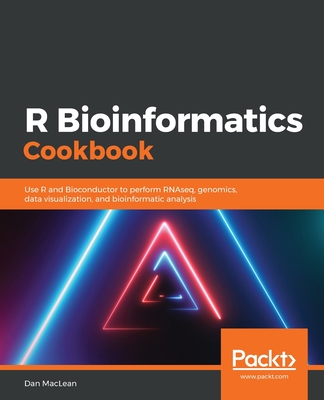Bioinformatics with Python Cookbook - Second Edition
Tiago Antao
- 出版商: Packt Publishing
- 出版日期: 2018-11-30
- 定價: $1,580
- 售價: 6.0 折 $948
- 語言: 英文
- 頁數: 360
- 裝訂: Paperback
- ISBN: 1789344697
- ISBN-13: 9781789344691
-
相關分類:
Python、程式語言、生物資訊 Bioinformatics
-
其他版本:
Bioinformatics with Python Cookbook, 3/e (Paperback)
買這商品的人也買了...
-
 $980Principles of Multimedia Database Systems (Hardcover)
$980Principles of Multimedia Database Systems (Hardcover) -
 Bioinformatics Algorithms: Design and Implementation in Python(美國原版)
Bioinformatics Algorithms: Design and Implementation in Python(美國原版)$4,150$3,943 -
 別說你不懂理財!善用 Python 幫助你投資獲利,改善財務
別說你不懂理財!善用 Python 幫助你投資獲利,改善財務$350$298 -
 Python 最強入門邁向數據科學之路 -- 王者歸來 (火力加強版)
Python 最強入門邁向數據科學之路 -- 王者歸來 (火力加強版)$799$679 -
 $1,827Introducing Python: Modern Computing in Simple Packages, 2/e (Paperback)
$1,827Introducing Python: Modern Computing in Simple Packages, 2/e (Paperback) -
 R Bioinformatics Cookbook
R Bioinformatics Cookbook$1,980$1,881 -
 Mathematics for Machine Learning (Paperback)
Mathematics for Machine Learning (Paperback)$1,480$1,450 -
 R語言數據可視化:科技圖表繪制
R語言數據可視化:科技圖表繪制$774$735
相關主題
商品描述
Discover modern, next-generation sequencing libraries from Python ecosystem to analyze large amounts of biological data
Key Features
- Perform complex bioinformatics analysis using the most important Python libraries and applications
- Implement next-generation sequencing, metagenomics, automating analyses, population genetics and more
- Explore and analyze bioinformatics data using standard statistics and Machine Learning approach
Book Description
With increasing biological data, there's a need for bioinformaticians in order to analyze them and extract insights. This book uses a unique recipe based approach to address the key building blocks in bioinformatics domain using Python ecosystem.
This book is packed with all the emerging topics ranging from Metagenomics, Transcription of DNA to RNA, Bioinformatics shell scripting, Web interaction, Automating analyses and more. You will get to work with different set of data such as sequence data, alignment data, range data, genome data and more for analyzing a large amount of biological data. You will get a better understanding of working with Galaxy server, which are the widely used bioinformatics web-interfaces. This book will also show you GPU computing for computationally complex problems via OpenCL and PyOpenCL. This second edition will also cover Machine Learning techniques in Bioinformatics. You will explore topics like SNP discovery using SVMs and exploratory analysis of data using standard statistic and ML approaches.
By the end of this book, you will be able to implement modern programming techniques and frameworks to deal with the ever-increasing deluge of bioinformatics data.
What you will learn
- Learn how to process large next-generation sequencing (NGS) datasets
- Work with genomic dataset using FASTQ, BAM and VCF formats from Python interface
- Explore the steps to perform sequence comparison and phylogenetic reconstruction
- Perform geometric operations with atom and molecule data
- Discover vilsualization techniques inside a galaxy server
- Learn GPU computing for computationally complex problems via OpenCL and PyOpenCL
- Visualise protein dataset interactions using Cytoscape
- Understand the steps involved in training an SVM for SNP discovery
Who This Book Is For
This book is for Data Scientists, Bioinformatics analysts, researchers, and Python developers who want to address intermediate-to-advanced common biological and bioinformatics problems with the recipe-based approach. Working knowledge of Python programming language is expected.
商品描述(中文翻譯)
發現來自Python生態系統的現代化、下一代测序库,以分析大量的生物数据
主要特點
- 使用最重要的Python库和应用程序进行复杂的生物信息学分析
- 实施下一代测序、宏基因组学、自动化分析、种群遗传学等
- 使用标准统计和机器学习方法探索和分析生物信息学数据
書籍描述
随着生物数据的增加,需要生物信息学家来分析这些数据并提取见解。本书使用独特的基于配方的方法,利用Python生态系统来解决生物信息学领域的关键构建模块。
本书涵盖了从宏基因组学、DNA到RNA的转录、生物信息学shell脚本、Web交互、自动化分析等各种新兴主题。您将使用不同类型的数据,如序列数据、比对数据、范围数据、基因组数据等,来分析大量的生物数据。您将更好地了解与Galaxy服务器一起工作,这是广泛使用的生物信息学Web界面。本书还将向您展示如何通过OpenCL和PyOpenCL进行GPU计算,以解决计算复杂问题。本书的第二版还将涵盖生物信息学中的机器学习技术。您将探索使用支持向量机进行SNP发现以及使用标准统计和机器学习方法进行数据的探索性分析等主题。
通过阅读本书,您将能够实施现代编程技术和框架,以应对不断增长的生物信息学数据。
您将学到什么
- 学习如何处理大型下一代测序(NGS)数据集
- 使用Python接口处理基因组数据集,包括FASTQ、BAM和VCF格式
- 探索执行序列比较和系统发生重建的步骤
- 处理原子和分子数据的几何操作
- 在Galaxy服务器内部发现可视化技术
- 通过OpenCL和PyOpenCL进行计算复杂问题的GPU计算
- 使用Cytoscape可视化蛋白质数据集的相互作用
- 了解训练SVM进行SNP发现的步骤
本书适合人群
本书适合数据科学家、生物信息学分析师、研究人员和Python开发人员,他们希望通过基于配方的方法解决中级到高级的常见生物学和生物信息学问题。需要具备Python编程语言的工作知识。










